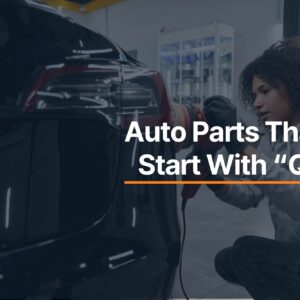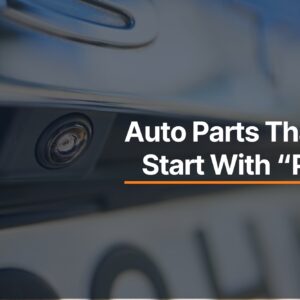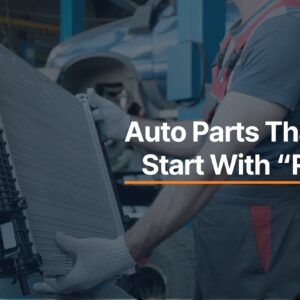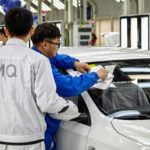Safety Glasses
Safety glasses are an accessory worn to protect the wearer’s eyes against hazards, such as flying particles, toxic compounds and vapors, and harmful gases. Safety glasses can also protect the wearer against light to moderate impacts. They can be used when grinding or cutting metal to protect the wearer’s eyes from metal shavings or particles. Safety glasses are typically made with impact-resistant glass or shatter-proof plastic lenses.
Category
Safety Lock Nuts
Safety lock nuts are a type of fastener with a special pattern on their head that requires a unique socket (called a key) to remove and install. Also called anti-theft lug nuts, rim locks, and tire locks, they might be needed if you want to reduce the risk of unauthorized removal and theft of parts. You can find safety lock nuts filling the same holes as standard lug nuts, which are usually used to secure parts like wheels and rims.
System
Related Articles
- How Do Wheel Locks Work? Tips for Installing and Removing Wheel Locks
- A Quick Guide on the Types of Bolts, Studs, and Nuts
- Lug Bolts vs. Lug Nuts: Picking the Right Wheel Fastener
Related Parts
Sampler Blower Motor
The Sampler Blower Motor is a miniature blower for the cabin air temperature sensor of Mercedes vehicles. Cabin air temperature sensors adjust the heating, ventilation, and air conditioning (HVAC) system after reading the cabin temperature. Over time, the miniature blower in the fan can go bad and will need replacing once it starts making loud noises. Together with the temperature sensor, the sampler blower motor is located in the dashboard, next to the ignition lock.
System
Related Parts
Sand Blaster Nozzle
A Sand Blaster Nozzle connects to a sand blaster to help direct and spread the contained abrasive material onto a targeted surface. There are different types of blast nozzles on the market, with each designed for different applications. Factors that affect a sand blaster nozzle’s effectiveness and spread include its size, shape, and material. Sand blaster nozzle materials include steel, tungsten carbide, boron carbide, and ceramic. Tungsten carbide nozzles are especially popular due to their durability.
System
Related Articles
Related Parts
Sander
The sander is a tool that uses an abrasive pad to smoothen the vehicle’s surface. This tool might be needed for buffing, polishing, and removing unwanted materials like old paint, rust, and varnish. Power sanders work faster than manually sanding the surface of the body panel, saving you time and energy. You might also need a sander for auto detailing work, such as repairing minor scratches.
System
Related Articles
- How to Get Paint Off Your Car: Easy and Effective Methods
- Do You Need Pneumatic Tools In Your Garage?
- How to Remove Scratches from Your Car Bumper
Related Parts
Scan Tool
A scan tool is a diagnostic device used to read engine trouble codes. It’s typically plugged into an OBD-I or OBD-II socket to identify and clear codes, as well as view data readouts from sensors.
A standard scan tool can also graph data, display pending codes, and provide troubleshooting procedures to resolve existing issues, depending on the type.
Some scan tools have premium features, including internet access, a built-in multimeter, and more.
System
Related Articles
- Should You Buy a Bidirectional Scan Tool and Other FAQ
- The Different Types of Scan Tools and Code Readers: Which is Right for You?
Related Parts
Schrader Valve Tool
The Schrader Valve Tool is a tool used to remove and install the Schrader valve, a common type of tire valve stem found on bicycles and vehicles. Also known as standard valves, Schrader valves are short and sturdy. They have a threaded outer wall for the cap and a bottom wrapped in rubber. You can find all kinds of Schrader valve tools on the market, including versatile double-sided ones that are suited for both long and short valves.
System
Related Articles
Related Parts
Scraper
A Scraper is a simple hand-held tool with a flat-tipped blade. The typical scraper has a small handle with a blade that’s made from either plastic or metal. As their name implies, scrapers are used to scrape a surface clean of sticky residue, paint, and other things that stick to it. In the automobile industry, there are specially designed scrapers for different jobs. These scrapers have blades of different sizes and shapes to suit the user’s needs.
System
Related Articles
- How to Remove Ice From Your Car and Windshield
- How To Get Sap Off Your Car
- Artillery Fungus on Cars: How To Remove It
Related Parts
Screw Cover
The Screw Cover is a part that covers the screws, protecting them from damage and rust while also improving appearances by hiding the unsightly fasteners. This part might be needed if the existing screw covers have worn out or become too damaged. Screw covers are mounted on the parts that need to conceal their screws, such as the interior door handle.
System
Related Articles
Related Parts
Seal Puller
A Seal Puller is a specialized automotive tool that helps remove the seals around transmissions, axles, engine cases, and wheel hubs. The puller’s tip fits behind the seal’s lip and can be maneuvered to pry the seal out. Seal puller designs differ and depend on the type of seal they’re designed to tackle. Some seal pullers come with interchangeable puller tips to accommodate more than one seal type.
System
Related Articles
- A Short Course on Automatic Transmissions
- Bad CV Axle Seal Symptoms
- Know Before You Go: Signs of a Leaking Wheel Seal
Related Parts
Seat Adjuster Assembly
A seat adjuster assembly includes mechanisms and controls that let you modify your seat’s position, angle, and other configurations. The exact design and features of seat adjuster assemblies vary depending on the make and model it’s intended for.
It’s important to note that not all vehicles have seat adjuster assemblies. Some older vehicles have manual seat adjuster assemblies, while other models don’t have adjustable seats.
System
Related Articles
Related Parts
Seat Adjustment Gear
A seat adjustment gear is a component in some vehicles’ automatic seat adjustment mechanism. The seat adjustment gear is one of the gears that allow certain components of an adjusting seat to move. Seat adjustment mechanisms let the driver or passenger adjust their seat position with the touch of a button. In these seats, a motor drives a set of gears that change the seat’s position. An adjusting seat can use several gears to move the seat’s backrest angle, distance to the steering wheel, and seat height.
System
Related Articles
- What Are Power Seats: How They Work, Common Issues
- Finding the Sweet Spot for Your Seating Position
- What Are Ventilated Seats and Are They Worth It?
Related Parts
Seat Back
The Seat Back is a part of the car seat that supports the driver or passenger’s back. This isn’t to be confused with the backseat, which refers to the seat behind the driver and the front passenger’s seat. The shape and style of seat backs can vary depending on the type of car seat. For example, bucket seats have a rounded seat back that wraps around the driver to prevent them from sliding around.
System
Related Articles
- What Is a Rear Seat Reminder and Why Is It So Important?
- High-Back Booster vs. Backless Booster Car Seats: What’s Safer For Your Kids?
- What Are Captain Seats? Advantages, Disadvantages, and More
Related Parts
Seat Back Organizer
A Seat Back Organizer attaches to the back of either of the front seats and provides storage space for various items. It’s accessible from the back seat and often has different pouches and pockets. The design of these organizers affects what can fit inside. Certain types hold files and folders, water bottles, and smaller items like pens and markers. Some pockets have velcro seals or zippers and can fold up neatly when not in use.
System
Related Articles
- 11 Simple Car Organization Hacks For Clutter-Free Driving
- 7 Tips for Organizing Your Subcompact Car
- Tips for Keeping Your Glove Compartment Clutter-Free
Related Parts
Seat Belt
The seat belt is a safety device that protects drivers and passengers from collisions by keeping them in place. This allows the impact to spread across a greater area, minimizing the risk of injuries.
People who use seat belts are also significantly less likely to be flung out of their vehicles in the event of an accident.
System
Seats, Seat Covers & Accessories
Related Articles
- How to Retract a Stuck Seat Belt
- Why There’s an Extra Loop on Your Seat Belt
- How to Wear A Seat Belt When Pregnant Safely
Related Parts
Seat Belt Extender Arm
A seat belt extender arm is a device that makes the seat belt longer.
System
Related Articles
- Fixing a Seat Belt That Won’t Pull Out or Is Jammed
- Why There’s an Extra Loop on Your Seat Belt
- How to Retract a Stuck Seat Belt
Related Parts
Seat Belt Pad
A seat belt pad is a cushion that wraps around a portion of the seat belt to soften the belt’s feel against the driver’s or passenger’s body. It prevents the skin from chafing or getting irritated from the seat belt material.
System
Related Articles
- Fixing a Seat Belt That Won’t Pull Out or Is Jammed
- Why There’s an Extra Loop on Your Seat Belt
- A Guide to Seat Belts: Function, Parts, and Why It Sometimes Won’t Retract
Related Parts
Seat Bracket
The Seat Bracket is a mounting point for car seats. This bracket is usually a fixed frame that prevents the seat from moving forward or backward without a slider.
A common type of seat bracket is a steel or aluminum metal frame that comes with holes to match a vehicle’s mounting scheme.
System
Related Parts
Seat Cover
Seat Covers protect the car seats from stains, spills, crumbs, dust, dirt, and other debris. They also slow down the car seat’s deterioration and let owners customize their ride’s appearance and style.
System
Related Articles
- Car Seat Cover Buyers Guide
- Everything You Need to Know About Car Seat Covers
- Can You Put Seat Covers on Heated Seats and Is it Safe?
Related Parts
Seat Cushion
A Seat Cushion provides additional padding to a car seat, making the seat more comfortable by distributing the weight of the driver or passenger more evenly. There are a lot of benefits that come with using a seat cushion, from preventing tailbone pain to promoting good posture.
System
Related Articles
- Are Your Heated Seats Not Working? This Could Be Why
- Solving Awkward Seat Adjustments and Other Challenges for Short Drivers
- High-Back Booster vs. Backless Booster Car Seats: What’s Safer For Your Kids?
Related Parts
Seat Foam
A Seat Foam is a form of padding that adds comfort when sitting in your car.
Most seat foams are made from polyurethane foam as the material is highly durable, comfortable, and protective.
There are also some manufacturers that use PUR polyester and PUR polyether, which are both types of plastic.
System
Related Articles
- DIY Leather Car Seat Repair and Maintenance
- How To Clean a Car Seat With Urine Stains
- Simple Tips for Removing Tough Stains From Your Car Seats
Related Parts
Seat Heat Pad
A Seat Heat Pad is an accessory that provides warmth and comfort while sitting by generating heat. This makes heated seats ideal for cold weather, long drives, or outdoor events. You can also use them on your office chair.
System
Related Articles
Related Parts
Seat Heater Switch
The Seat Heater Switch toggles the seat heater on and off. Like all switches, it is an electrical component that either opens or closes the current, meaning it dictates when its corresponding electronic auto part activates and deactivates.
The seat heater itself is responsible for keeping a car seat warm through heating coils underneath the seat cover. Flipping the switch toggles these coils on or off.
System
Related Articles
- Heated Seat Installation Tips
- Are Your Heated Seats Not Working? This Could Be Why
- Can You Put Seat Covers on Heated Seats and Is it Safe?
Related Parts
Seat Motor
Typically found in power seats, the Seat Motor helps adjust the position of the car seat, particularly its height.
System
Related Articles
- Power Seat Switch Replacement Tips
- What Are Power Seats: How They Work, Common Issues, & FAQs
- What Are Captain Seats? Advantages, Disadvantages, and More
Related Products
Seat Mount
A Seat Mount is designed to securely attach seats to the vehicle’s frame or floor. It provides a stable and secure base for seats, ensuring safety and comfort. Mounts are usually made from durable materials like steel or aluminum.
System
Related Articles
Related Parts
Seat Relay
The Seat Relay is responsible for controlling the power supply to various seat functions, such as heating, seat adjustment, and seatbelt warnings. The seat relay serves as a switch that either opens or closes the circuit, activating or deactivating seat features.
System
Related Articles
- Power Seat Switch Replacement Tips
- Are Your Heated Seats Not Working? This Could Be Why
- Heated Seat Installation Tips
Related Parts
Seat Release Handle
The Seat Release Handle is a component that allows the user to adjust or fold the seats. It lets the user release the seat latch, so the seat folds down or moves forward/backward. The handles are usually on the side or back of the seat, depending on the vehicle.
System
Related Articles
Related Parts
Seat Repair Kit
Seat Repair Kits are used to repair different components of car seats. These kits typically contain tools and replacements for damaged tracks, rails, and gears.
System
Related Articles
- Are Your Heated Seats Not Working? This Could Be Why
- DIY Leather Car Seat Repair and Maintenance
- Most Common Car Interior Repairs and How Much They Typically Cost
Related Parts
Seat Riser
The Seat Riser is a component of the car seat that allows the driver or passenger to adjust their seat height accordingly. It’s especially helpful for drivers who might be too short and find it difficult to see above the steering wheel. Seat risers are typically made from high-quality steel, and they also come in different finishes. They’re sold separately from the seat riser brackets and have different maximum lifting heights.
System
Related Articles
- Replacing Seats in a Car: When to Do It and What to Consider
- What Are Power Seats: How They Work, Common Issues, & FAQs
- Why There’s an Extra Loop on Your Seat Belt
Related Parts
Seat Slider
The seat slider is the mechanism under your driver or passenger seat that allows you to slide the seat forward or backward. This mechanism is crucial since drivers will need to adjust their seat’s position relative to the pedals depending on their height.
System
Related Articles
- Solving Awkward Seat Adjustments and Other Challenges
- Finding the Sweet Spot for your Seating Position
Related Parts
Serpentine Belt
The serpentine belt is the long rubber belt that transfers power to various vehicle parts and electronics such as the alternator, power steering pump, air conditioning, and water pump. Without the serpentine belt, these systems won’t be able to receive the power necessary for them to function. The belt is guided by idler pulleys and tensioners that keep the belt taut. Over time, serpentine belts can become loose and require replacement.
System
Related Articles
- Serpentine Belt: Symptoms, Replacement Cost, and More
- Serpentine Belt Routing & Replacement
- Mastering the Different Types of Car Belts
Related Parts
Serpentine Belt Tool
The serpentine belt tool is a tool for removing and installing serpentine belts in systems with spring-loaded idler pulleys. This tool might be needed if you plan to repair or replace the serpentine belt. Serpentine belt tools can help you access the belt tensioners in hard-to-reach areas. The serpentine belt is easier to work with if you have the serpentine belt tool to facilitate removal and installation.
System
Related Articles
- Serpentine Belt Routing & Replacement (Example Diagram)
- Serpentine Belt: Symptoms, Replacement Cost, and More
- Mastering the Different Types of Car Belts
Related Parts
Shackle Bolt
The Shackle Bolt is a type of suspension bolt that locks shackle links into place between the leaf spring suspension and the vehicle or trailer. Shackle links connect the vehicle body to the wheels, and they’re held in place by shackle bolts. Shackle bolts come in different sizes, and they’re typically made of high-quality metal with a zinc finish to prevent corrosion. You can get shackle bolts individually or in a set with other parts of the shackle assembly.
System
Related Articles
Related Parts
Shackle Bushing
The Shackle Bushing is the bushing positioned in the leaf spring shackle. It allows movement within the vehicle’s suspension system by protecting the shackle as the shackle moves against the other parts in the system. The shackle connects the leaf springs to the frame of the vehicle, which inevitably leads to a lot of friction as the vehicle moves. The shackle bushing extends the shackle’s life and helps it support the load from the leaf springs.
System
Related Articles
Related Parts
Shift Boot
A Shift Boot covers the gear shifter and protects it from dust, dirt, and debris. It’s usually made from cloth, vinyl, rubber, or leather. Besides functionality, shift boots can also enhance the look of the car interior.
System
Related Parts
Speaker
The Speaker is responsible for playing audio inside your vehicle. It allows drivers and passengers alike to listen to the radio, navigation, and other systems that use sound to relay information.
System
Related Articles
- The Best Songs To Test Your Car Speakers
- What Size Of Speakers Can Fit In My Car? A Buyer’s Guide for Car Speakers
- Must-Have Car Accessories For Your Next Tailgate Party
Related Parts
Speed Sensor
The Speed Sensor is a device that measures the wheels or transmission’s rotation speed. The sensor sends this data to the onboard computer to control the speedometer and adjust the transmission shift points. The onboard computer also uses the information from this sensor to manage the anti-lock braking and traction control systems.
System
Related Articles
- What Is a Speed Sensor and What Does It Do?
- What are the Symptoms of a Bad Speed Sensor?
- How To Test a Speed Sensor
Related Parts
Speedometer
A Speedometer displays vehicle speed based on the readings generated from the gearbox output shaft.
System
Related Articles
- Speedometer Calibration Explained: Common Questions Answered
- Where Is the Speedometer Cable Located?
- Five Reasons Why Your Speedometer Isn’t Working
Related Products
Sun Visor
The Sun Visor is a flat panel designed to be placed at the front window to protect the vehicle’s cabin from the sun. It protects the driver’s eyes from blinding sunlight and lowers the interior temperature by reflecting direct sunlight.
Prolonged direct contact with UV light can damage the stereo systems, CDs, dashboards, and car seats.
System
Related Articles
Related Parts
Sunroof Motor
When activated, the Sunroof Motor moves the cable that pulls the sunroof panel inward or outward. The motor stops operating as soon as the panel reaches the open position.
System
Related Articles
- Was Your Sunroof Left Open in the Rain? What to Do and Check
- What Are Common Sunroof Repairs?
- The Difference Between a Sunroof and a Moonroof Explained
Related Parts
Any information provided on this Website is for informational purposes only and is not intended to replace consultation with a professional mechanic. The accuracy and timeliness of the information may change from the time of publication.

















